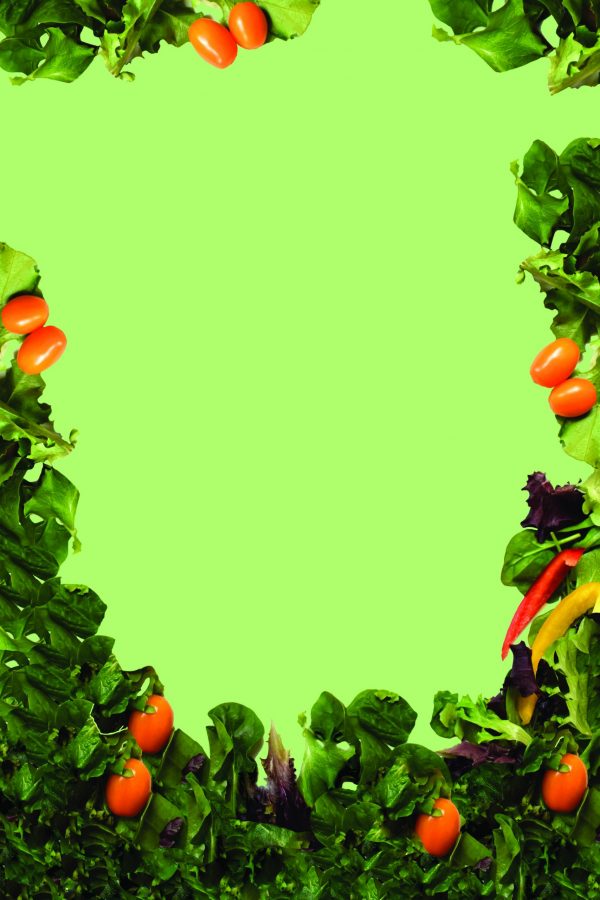Determined to both contribute to a bake sale fundraiser for sustainable forestry and to comply with her newly vegan diet, Lexie Warlick ’21 mixed dark chocolate, vegan butter and applesauce into her chocolate chip cookie batter. The next morning, she left her goods out on the sale table, expecting them not to receive much appeal due to the recipe’s unconventional substitutions. To her surprise, her baked goods sold out.
“One of my favorite things about being vegan was baking,” Warlick said. “It allowed me to explore new alternatives to animal products and have fun with the possibilities.”
Though making plant-based dishes can be entertaining, understanding the environmental impacts of different diets is far more significant, John Szijjarto ’21 said.
“If the whole world were to go vegan at once, it would drastically decrease the amount of carbon dioxide and methane in the world,” Szijjarto said. “The way that we raise animals and process meat uses a ton of water and greenhouse gases, so adjusting to a plant-based diet would definitely bring environmental benefits.”
According to the Vegan Society, veganism and vegetarianism have recently increased in popularity, and have been driving the market to cater towards healthier lifestyles. In a study conducted by the Harris Poll in 2019, two and four percent of American adults considered themselves vegan and vegetarian, respectively. In addition, according to Nielsen Holdings, six times as many consumers in the United States identified as vegan in 2017 than in 2012.
Students and teachers discuss whether people are aware of the environmental effects of a plant-based diet
The increasing danger of climate change has encouraged more people to shift to plant-based diets, Advanced Placement Environmental Science teacher Nancy Chen said.
“I believe that people are going vegan and vegetarian because it helps our planet,” Chen said. “Right now, our planet is being exploited to suit our wants, which dramatically influences the effects of climate change.”
Chen said that there is still a lack of awareness about the specific ways an individual’s diet can promote sustainability.
“There are people who converted to veganism or vegetarianism because they know what the environmental effects are,” Chen said. “There are also others who know that there are environmental impacts but can’t say for certain what the impacts are.”
Following plant-based diets may also result in economic benefits, according to findings from the Proceedings of the National Academy of Science. The study showed that if Americans continue to follow meat-based diets rather than a plant-based ones, the U.S. economy could lose up to 1.6 trillion dollars by 2050 due to reduced healthcare costs and fewer environmental damages.
“I think that the potential economic impact of a larger vegetarian population is outweighed by the need for vegetarianism in order to help the environment,” Warlick said. “It’s comparable to replacing fossil fuels with renewable resources, where old business becomes outdated and new industries open up with more economic opportunities, while still providing a better and more sustainable future for the earth.”
Some people look to health benefits when adapting a plant-based diet.
However, in a study conducted by Mintel, under 25 percent of those interested in reducing their meat consumption said they would do so primarily because of environmental consequences, while 49 percent cited health reasons.
“It’s a cleaner diet,” Szijjarto said. “Eating too much red meat could lead to some cardiac health complications and certainly a plant-based diet would eliminate those concerns.”
According to the Proceedings of the National Academy of Sciences, a widespread adoption of such a diet could help save around 8 million lives by 2050 and a vegetarian diet would save about 7.3 million.
Although many people look forward to the health advantages, Szijjarto also said that an absence of meat in one’s diet may not be enough to support one’s health.
“I think that there’s a lot of nutrients and proteins in meat that are definitely possible to get from vegan or vegetarian food sources, but it’s harder,” said Szijjarto. “There just aren’t that many proteins in legumes which is one really big source of food that many people look to.”
Sophie Johnson ’21 said that while some people may be more inclined to go vegan or vegetarian because of the environmental benefits, many do so in order to follow current trends.
“I think it depends on the individual, but some people I’ve talked to are really uninformed and are going along with the trend,” Johnson said. “Some other people do understand that what they are doing benefits the environment and are changing their diets to help the cause.”
As a vegetarian herself, Warlick said she wants to encourage more people to work on exploring plant-based diets.
“Becoming vegetarian is a lot easier than most people think,” Warlick said. “Not eating meat has definitely left a lasting impact on me, and I don’t think I can ever go back now.”































